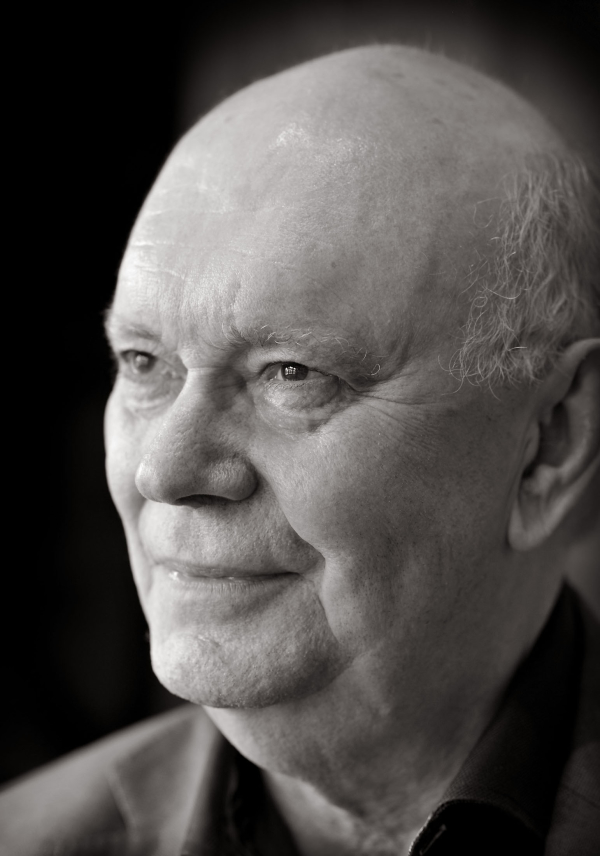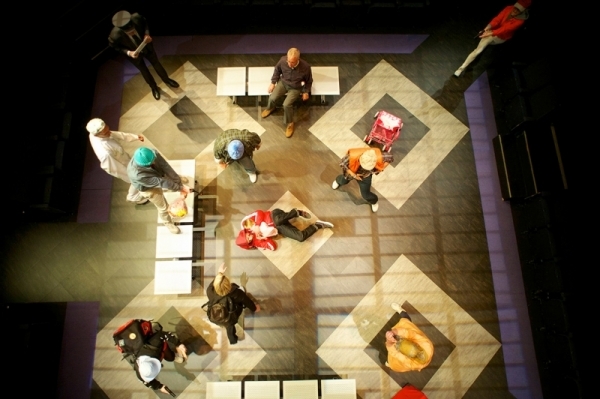At 78 Plays and Counting, Legendary Dramatist Alan Ayckbourn Shows No Signs of Slowing Down

(© Andrew Higgins)
It's safe to call Sir Alan Ayckbourn the world's most prolific playwright. After all, at 75 years of age, the British dramatist has penned 78 plays, a list that includes, most notably, Absurd Person Singular, Bedroom Farce, and the Tony- and Drama Desk Award-winning trilogy The Norman Conquests. Ayckbourn's plays don't merely buck conventions; they throw conventions out the window and never look back. The three plays of Norman Conquests depict the events of one weekend in a trio of different locations. Joking Apart (1978) features a live tennis match onstage, and House & Garden (1999) comprises two plays to be performed simultaneously, by one company of actors, in adjoining auditoriums.
Every two years, Ayckbourn and a group of actors from Scarborough, England's Stephen Joseph Theatre Company (an organization he ran from 1972 to 2009) come to Manhattan to present the author's latest as part of 59E59 Theaters' Brits Off Broadway festival. This year, there's not just one play. Ayckbourn Ensemble is the umbrella title for three…well, four plays being presented through June 29: the brand-new Arrivals and Departures, a revival of 1992's Time of My Life, and a double bill of two new short plays titled Farcicals. Ayckbourn directs them all.
These particular plays were linked together out of "practical necessity," Ayckbourn says in his New York hotel room on a sunny Friday afternoon. "Since I gave up running the theater, the new director has asked me back to do a revival and a new play, containing the same company." He really wanted to bring back the seven-character Time of My Life, a play he's "very fond of," but needed to "write something on a bigger canvas." Using that actor count as a jumping-off point, he created Arrivals and Departures, a memory play about two strangers brought together to capture a wanted terrorist. By the time he finished writing, Arrivals had four extra characters, creating the need for an 11-member company. Since seven only appeared in the revival, "I agreed, rather stupidly, to write another play, which is a double bill, with the remaining four actors."
Ayckbourn insists that he always writes with his director's hat on, even when his stage directions seem impossible. "What I feel," he notes, "is that theater is naturally fifty-percent visual…I used to read the odd play from a new dramatist and go, 'Oh, this is good, but what the hell am I going to do with it?' There's no physical movement; one says, 'Would you like a cup of tea?' and they could both finish by sitting in chairs. So the question is, why do it? It might as well end up as a radio play."

(photo courtesy of the production)
As for Arrivals and Departures, it doesn't require much in the way of a complex staging, but that doesn't mean it's not an easy-to-stage play. "I wanted to invert a usual stage convention," Ayckbourn says. "When you write a play, usually two characters come on, and as you perceive them and they let things out, you learn more and more about them, and so do they. In this play, the same thing happens, except neither character learns anything more about each other. We see all the information about A and B come via flashbacks."
Time of My Life, in similar fashion, features time "literally moving in three ways. There's an older couple sitting at a table, and their time is real time, auditorium time. Another couple, their older son and his wife, we follow through forward time, and their storyline covers two years. The other couple, the younger son and his unsuitable girlfriend, moves middle-speed. Their relationship covers two months, which goes backwards. So it covers two hours, two years, and two months. It's linked to the theme of the play, which is enjoy the moment."
Enjoying the moment is one of Ayckbourn's new outward mantras, after having suffered a stroke in 2006, which now requires him to walk with a cane. It very nearly debilitated his writing career, too. "I noted it was the first time I didn't have an idea," he remembers. "I had been writing since I was seventeen and I'd always have the idea for the next play. An awful feeling of end-of-career panic set in." But then, a week or two later "a germ of an idea" came into his head.
"Everything depends on that very first little germ of an idea," he confesses. "I have to naively believe I'm writing something new, and something better. People always ask, 'Do you have a favorite play?' and I say 'Yes, the next one, because it's better.' That's the way you pull yourself forward."
And that he does. "These days, I tend to be a little more circumspect [about writing] because it takes a little bit longer to plan. But I've written this year's play [titled Roundelay], and it's already being cast. And I'm dreaming up next year's." In the immediate future, though, Ayckbourn returns to England with a musical version of his 1998 family-geared play The Boy Who Fell Into a Book, which begins performances at the Stephen Joseph on July 18 and has a score by Cathy Shostak, Eric Angus, and Paul James. Once again, Ayckbourn directs. "I'm not sitting through someone else's production," he says with a laugh.

(© Tony Bartholomew)











